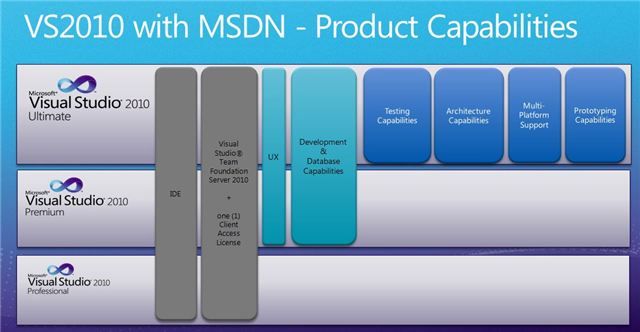Visual Studio 2010 is going to release on March or April 2010. And still People are a bit confused between the different editions of Visual Studio.
Does a developer need Visual Studio professional (the main IDE to write code) or a Team Developer?
A developer may need some testing or modelling capabilities only available in the Team Test or Team Architect edition, so what is the recommended SKU ?
As Visual Studio 2010 is extending the capabilities (test management, code visualisation ….), the right move was not to add more editions but to simplify the product family.
We’ll have 3 levels of Visual Studio
Visual Studio 2010 Professional – the basic one
Visual Studio 2010 Premium – the standard one
Visual Studio 2010 Ultimate – the advanced one
go on http://www.microsoft.com/india/visualstudio/products/2010/default.mspx for a full description (click on “compare 2010 products”)

Visual Studio 2010 professional with MSDN will include
- Visual Studio 2010 professional – the “editor” to write code on the Microsoft platform
- The full Team Foundation Server (1 license of TFS per license of Visual Studio 2010 pro w/ MSDN)
- TFS is the main repository to manage, integrate and offer a comprehensive reporting solution for
- Source code management (no more VSS, CVS, Subversions, Clear Case…)
- Project management (JIRA, “Excel file”)
- Bug tracking (JIRA…)
- Build management (Cruise control)
- Test management
- Requirement management
- Project reporting ….
- TFS is the main repository to manage, integrate and offer a comprehensive reporting solution for
I will describe VS2010 Pro w/ MSDN as the “basic” edition because writing code and managing the project (source code, bug, tracking …) is the minimum you should do when building a software application.
Visual Studio 2010 Premium with MSDN will include
- Visual Studio 2010 professional with MSDN
- Additional tools you may need when building solution using advanced User Experience (UX) technologies (Silverlight, WPF) – aka the actual Expression Studio.
- Writing solutions with VS2010 Pro and managing the project with TFS is already good but not enough. Before sharing code with the rest of the team who is checking the code quality? the code complexity? Who is managing the database?
- Visual Studio 2010 Premium will include code quality tools (unit test, code profiler, code maintenability and complexity report known as “code metrics”, static code analysis…)
- Visual Studio 2010 Premium will include the database change management capabilities (schema and data generation and reverse engineering, Test data generation, unit test on DB objects, DB deployment by script or direct update)
This list of capabilities is not exhaustive but it gives you enough information to see that Visual Studio 2010 Premium is the “by default” edition for a developer. That why we could qualify this edition as “standard”.
Visual Studio 2010 Ultimate with MSDN will include
- Visual Studio 2010 Premium with MSDN
- Testing capabilities
- Play and record the test – Web test, UI test, coded UI test, load test, manual test (most of needs from a specialist to a generate tester)
- Manage and run the test – specific QA console to run the test outside of Visual Studio
- Use virtual machines as part of the test environment (you can even capture the status of each virtual machines when reporting a bug so the developers can re-start the same virtual environment).
- VS2010 Ultimate (and Test Essential too) will include Microsoft Test and Lab Manager (MTLM) and the capability to configure Lab Management. MTLM gives the rights to access a lab management environment but not the processor license to run the virtual environment. You will need an additional license of Visual Studio Team Lab Management 2010 (per processor).
- MTLM (MTL Manager – “the client”) doesn’t require a license of MTL Management (“the server”) to manage and run the test. It’s only if you need to use a virtual environment that you need an additional license of MTL Management (per rocessor)
- Architecture capabilities
- UML support (Use Case, Activity diagram, sequence diagram …)
- Code visualisation (useful when reviewing code and understanding legacy applications)
- Support of non-Microsoft platform (if you are building solution on UNIX, Linux, MAC OS or using Eclipse)
- Microsoft is supporting the integration to TFS so you can use the same repository (source code, versions, project management, test run and results, bug tracking …) regardless of the platform you are using.
- Prototyping capabilities (known as “Sketchflow”).
- probably the missing link between capturing the requirements (with the business analysts) and managing the requirements (with the application dev team). You can quickly set up a prototype to not only capture the information screens by screens but also the workflow, the feeling of using the final solution. It’s like wire-framing some screen-shots and that will help you better align with the business at the very first step.
As a developer may need some testing or code visualisation capabilities, Visual Studio Ultimate is not only for the testers and the architects but the developers too. Again think about capabilities and not edition “per role”. That why We would describe Visual Studio 2010 Ultimate as the advanced edition.
Discover more from C4: Container, Code, Cloud & Context
Subscribe to get the latest posts sent to your email.